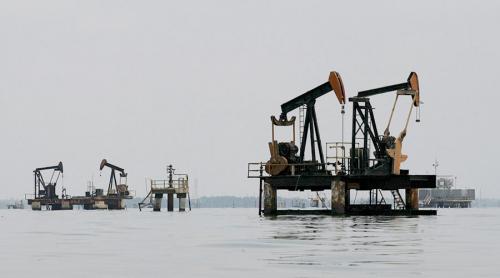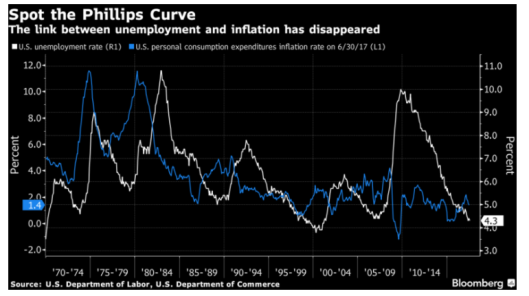Steve Bull's Blog, page 1329
August 29, 2017
Systemic Change Driven by Moral Awakening Is Our Only Hope
Our core ecological problem is not climate change. It is overshoot, of which global warming is a symptom. Overshoot is a systemic issue. Over the past century-and-a-half, enormous amounts of cheap energy from fossil fuels enabled the rapid growth of resource extraction, manufacturing and consumption; and these in turn led to population increase, pollution and loss of natural habitat and hence biodiversity.
The human system expanded dramatically, overshooting Earth’s long-term carrying capacity for humans while upsetting the ecological systems we depend on for our survival. Until we understand and address this systemic imbalance, symptomatic treatment (doing what we can to reverse pollution dilemmas like climate change, trying to save threatened species and hoping to feed a burgeoning population with genetically modified crops) will constitute an endlessly frustrating round of stopgap measures that are ultimately destined to fail.
The ecology movement in the 1970s benefitted from a strong infusion of systems thinking, which was in vogue at the time (ecology—the study of the relationships between organisms and their environments—is an inherently systemic discipline, as opposed to studies like chemistry that focus on reducing complex phenomena to their components). As a result, many of the best environmental writers of the era framed the modern human predicament in terms that revealed the deep linkages between environmental symptoms and the way human society operates. Limits to Growth (1972), an outgrowth of the systems research of Jay Forrester, investigated the interactions between population growth, industrial production, food production, resource depletion and pollution. Overshoot (1982), by William Catton, named our systemic problem and described its origins and development in a style any literate person could appreciate. Many more excellent books from the era could be cited.
…click on the above link to read the rest of the article…
US deployment of new B61-12 nukes to Europe would violate non-proliferation treaty – Moscow

© AiirSource Military / YouTube
Washington will violate its commitment to the Non-Proliferation Treaty if it deploys the new B61-12 nuclear bombs to NATO allies in Europe, the Russian Foreign Ministry has warned. The statement comes after the recent second test of the weapon.
“The most recent variations of the B61-12 bombs are also designed for deployment to the territory of a number of NATO countries in Europe for use as part of the so-called nuclear missions involving pilots from the alliance’s non-nuclear member-states,” the director of the Russian Foreign Ministry’s Department for Non-Proliferation and Arms Control Department, Mikhail Ulyanov, told TASS news agency.
“According to our assessment, this runs counter to the NPT [the Non-Proliferation Treaty] commitments,” the Russian diplomat said on Tuesday after the US National Nuclear Security Administration (NNSA) announced it had conducted the second successful flight test of B61-12 gravity nuclear bombs in Nevada.
Read more
 US holds 2nd test of B61-12 gravity nuclear bombs
US holds 2nd test of B61-12 gravity nuclear bombs
Ulyanov recalled his previous doubts about the upgraded weapon, which he says could “lower the threshold of using nuclear weapons.”
“US military specialists claim that this bomb will be more ethical and more usable, because it has greater accuracy and results in less catastrophic effects for civilians if used on vast areas,” Ulyanov said.
“This prompts the conclusion that when they go operational, such bombs may objectively lower the threshold of using nuclear weapons. We see this as the key negative effect of the ongoing upgrade work.”
The US has repeatedly accused Russia of NPT violations to cover the upgrade of its own nuclear arsenal, the diplomat believes.
“There is such a feeling that these accusations serve also as a smoke screen to modernize rather dangerous US potential,” Ulyanov stated.
…click on the above link to read the rest of the article…
Opinion: No, hurricanes are not good for the economy
Yes, GDP may get a temporary boost from rebuilding, but there’s nothing positive about destruction
 REUTERS/Adrees LatifThink of the increased production of motor vehicles to replace all those flooded trucks!
REUTERS/Adrees LatifThink of the increased production of motor vehicles to replace all those flooded trucks!Once the immediate danger of a natural disaster subsides, and the loss of life, property damage, cost of rebuilding, and degree of insurance coverage can be assessed, attention generally turns to the economic effect. How will Hurricane Harvey affect the nation’s gross domestic product?
You will no doubt hear assertions that the rebuilding effort will provide a boost to contractors, manufacturers and GDP in general. But before these claims turn into predictable nonsense about all the good that comes from natural disasters, I thought it might be useful to provide some context for these sorts of events.
The destruction wrought by a hurricane and flooding qualifies as a negative supply shock. Normal production and distribution channels are destroyed or disrupted. Producers have to find less-efficient (i.e. more expensive) ways to transport their goods. The net effect is lost output and income, and higher prices.
Over the years, I’ve observed a tendency among economists and traders to view such events through a demand-side prism. They see lost income translating into reduced spending on goods and services, which might even warrant some largesse from the central bank.
Of course, that is precisely the wrong medicine. Supply shocks reduce output and raise prices. The Federal Reserve’s interest-rate medicine affects demand. Lower interest rates will increase the demand for gasoline, among other goods and services, but they have no effect on supply. An easing of monetary policy under such circumstances would increase demand for already curtailed supply, raising prices even more.
…click on the above link to read the rest of the article…
Fed Study Shows Phillips Curve Is Useless: Admitting the Obvious
The Phillips Curve, an economic model developed by A. W. Phillips purports that inflation and unemployment have a stable and inverse relationship.
This has been a fundamental guiding economic theory used by the Fed for decades to set interest rates.
A new Fed Study shows the Phillips Curve Doesn’t Work.
A fundamental relationship of mainstream economic theory at the heart of the Federal Reserve’s strategy for setting interest rates has been a poor guide for policy makers for at least three decades, according to a study by the Philadelphia Fed’s top-ranking economist.
The paper, co-authored by Philadelphia Fed Director of Research Michael Dotsey, shows that forecasting models based on the so-called Phillips curve, which asserts a link between unemployment and inflation, don’t actually help predict inflation.
“Our results indicate that monetary policymakers should at best be very cautious in their reliance on the Phillips curve when gauging inflationary pressures,” Dotsey and Philadelphia Fed economists Shigeru Fujita and Tom Stark wrote.
Their study is timely. Fed officials have been surprised by a deceleration in U.S. inflation over the past several months despite a continued decline in unemployment, the opposite of what the Phillips curve relationship would predict.
The Philadelphia Fed economists found that rising unemployment was sometimes able to help predict lower inflation, but falling unemployment didn’t help predict higher inflation. They noted that was particularly the case during the 1970s and early 1980s when the Fed responded to runaway inflation by raising rates so high that the U.S. economy fell into recession.
“Our evidence may indicate that using the Phillips curve may add value to the monetary policy process during downturns, but the evidence is far from conclusive,” they wrote. “We find no evidence for relying on the Phillips curve during normal times, such as those currently facing the U.S. economy.”
…click on the above link to read the rest of the article…
August 28, 2017
Capitalism—A New Idea

Capitalism, whether praised or derided, is an economic system and ideology based on private ownership of the means of production and operation for profit.
Classical economics recognises capitalism as the most effective means by which an economy can thrive. Certainly, in 1776, Adam Smith made one of the best cases for capitalism in his book, An Inquiry Into the Nature and Causes of the Wealth of Nations (known more commonly as The Wealth of Nations). But the term “capitalism” actually was first used to deride the ideology, by Karl Marx and Friedrich Engels, in The Communist Manifesto, in 1848.
Of course, whether Mister Marx was correct in his criticisms or not, he lived in an age when capitalism and a free market were essentially one and the same. Today, this is not the case. The capitalist system has been under attack for roughly 100 years, particularly in North America and the EU.
A tenet of capitalism is that, if it’s left alone, it will sort itself out and will serve virtually everyone well. Conversely, every effort to make the free market less free diminishes the very existence of capitalism, making it less able to function.
Today, we’re continually reminded that we live under a capitalist system and that it hasn’t worked. The middle class is disappearing, and the cost of goods has become too high to be affordable. There are far more losers than winners, and the greed of big business is destroying the economy.
This is what we repeatedly hear from left-leaning people and, in fact, they are correct. They then go on to label these troubles as byproducts of capitalism and use this assumption to argue that capitalism should give way to socialism.
…click on the above link to read the rest of the article…
China is going to hit a wall

“There is probably no company that is more representative of the investment bubble than Evergrande. It’s the biggest pyramid scheme the world has yet seen”, says Anne Stevenson-Yang (Bild: James Wasserman )
Anne Stevenson-Yang, co-founder and research director at J Capital, warns that the monster bubble in the Chinese housing market is ripe to pop and that the Chinese currency will crash.
It’s been exactly two years now since turmoil in China’s currency markets threw investors around the globe into panic. After the shock in late August of 2015, another tantrum followed in early 2016. Since then concerns about China have diminished. The consensus seems to be that Beijing once again has regained control. Nonetheless, Anne Stevenson-Yang remains skeptical. The co-founder of the influential research firm J Capital warns that the speculation in the Chinese real estate market is getting evermore excessive. “There is little comfort that the economy can go on for much longer without some catastrophic adjustment”, says the American who’s one of the most distinguished experts on China. She expects that China’s currency will devalue significantly and explains why the Chinese government is cracking down on HNA and other Chinese companies that have been on an overseas buying spree.
Ms. Stevenson-Yang, many investors don’t seem to care much about China anymore. How is the situation inside the Middle Kingdom two years after the currency shock of August 2015?
Everyone in China – from the government at every level to the people who work in banks, construction companies and real estate companies – is one hundred percent focused on how to push growth with more investment. That’s all people think about. Everybody is maniacally focused on the questions if investments will continue and if investments can continue to drive growth.
…click on the above link to read the rest of the article…
Nomi Prins: Big Bank Concentration and Counterparty Risk Expands

Nomi Prins: Big Bank Concentration and Counterparty Risk Expands
Nomi Prins joined Sprott Money News for its Ask the Expert segment that covered the Federal Reserve system, Glass-Steagall reform and even the recent activity from the U.S Treasury.
Beginning the conversation she highlighted U.S debt and the position of U.S treasury bonds. Prins remarks, “One of the reasons in general that government debt is considered an asset is that it can be traded and holds enough liquidity to either raise money or post as collateral for other forms of capital. They have an intrinsic benefit in the financial system between central banks, large multinational institutions and banks, etc.”
“U.S Treasury bonds also have the idea behind them that they have this implicit guarantee by their respective government that they will not default. Even though, right now, these bonds barely have any interest from a return perspective and are not particularly lucrative, it does have the idea behind them that it is not going to lose its value.”
Nomi Prins is a former Wall Street insider where she worked as a Managing Director at Goldman Sachs among other major financial outlets. She is also a best-selling author who wrote All the Presidents’ Bankers, a book that examines the hidden alliances between Wall Street and Washington.
Switching gears, she was pressed on whether the U.S treasury bonds could face a replacement Nomi Prins noted, “In the current international monetary system we have where the U.S dollar is the major reserve currency there is a necessity for central banks and private banks to use and have the U.S treasury bonds. The bonds are used to balance payments and used for potential liquidity emergency mechanisms and any other financial circumstances.”
…click on the above link to read the rest of the article…
What Is the Liquidity Trap?

Some economists such as a Nobel Laureate Paul Krugman are of the view that if the US were to fall into liquidity trap the US central bank should aggressively pump money and aggressively lower interest rates in order to lift the rate of inflation. This Krugman holds will pull the economy from the liquidity trap and will set the platform for an economic prosperity. In his New York Times article of January 11, 2012, he wrote,
If nothing else, we’ve learned that the liquidity trap is neither a figment of our imaginations nor something that only happens in Japan; it’s a very real threat, and if and when it ends we should nonetheless be guarding against its return — which means that there’s a very strong case both for a higher inflation target, and for aggressive policy …(of the central bank).
But does it make sense that by means of more inflation the US economy could be pulled out of the liquidity trap?
The Origin of the Liquidity-Trap Concept
In the popular framework of thinking that originates from the writings of John Maynard Keynes, economic activity presented in terms of a circular flow of money. Spending by one individual becomes part of the earnings of another individual, and spending by another individual becomes part of the first individual’s earnings.
Recessions, according to Keynes, are a response to the fact that consumers — for some psychological reasons — have decided to cut down on their expenditure and raise their savings.
For instance, if for some reason people have become less confident about the future, they will cut back on their outlays and hoard more money. Therefore, once an individual spends less, this worsens the situation of some other individual, who in turn also cuts his spending.
…click on the above link to read the rest of the article…
China Slams White House For Latest Sanctions On “Close Ally” Venezuela
Shortly after the White House unveiled new sanctions last Friday against Venezuela while prohibiting U.S. trading in various bonds issued by the country (while exempting the notorious Goldman “Hunger Bonds”), Venezuela’s “close ally” China slammed the latest diplomatic crackdown and said on Monday that external interference and unilateral sanctions only make things “more complicated and will not help resolve problems.”
Asked by reporters about the new U.S. measure, Chinese Foreign Ministry spokeswoman Hua Chunying said China’s position had consistently been to respect the sovereignty and independence of other countries and not to interfere in their internal affairs. “The present problem in Venezuela should be resolved by the Venezuelan government and people themselves.”
“The experience of history shows that outside interference or unilateral sanctions will make the situation even more complicated and will not help resolve the actual problem,” Hua told the daily news briefing.

Oil pumps in Lake Maracaibo, Lagunillas, in the state of Zulia, Venezuela
As discussed on previous occasions, China and Venezuela have extensive business links, with oil being the largest, where the countries have a multi-billion loan-for-oil deal, which assures Beijing of obtaining Venezuela crude at below market prices.
Earlier in August, China said it believed voting in Venezuela’s Constituent Assembly election was “generally held smoothly”, brushing off widespread condemnation from the United States, Europe and others and evidence of voting irregularities, as China wishes to remain on Maduro’s good side due to concerns that a public uprising and/or revolution would void its billions in loans made to the current regime which Venezuela has been repaying in barrels of crude. As Reuters reported recently, Venezuela owes China more than $62 billion and is behind in the oil shipments. The Maduro regime similarly owes Russia billions in loans under a similar arrangement.
…click on the above link to read the rest of the article…
When the Butterfly Flaps Its Wings
It remains to be seen what the impact will be from Mother Nature putting the nation’s fourth largest city out-of-business. And for how long? It’s possible that Houston will never entirely recover from Hurricane Harvey. The event may exceed the physical damage that Hurricane Katrina did to New Orleans. It may bankrupt large insurance companies and dramatically raise the risk of doing business anywhere along the Gulf and Atlantic coasts of the USA — or at least erase the perceived guarantee that losses are recoverable. It may even turn out to be the black swan that reveals the hyper-fragility of a US-driven financial system.
Houston also happens to be the center of the US oil industry. Offices can be moved elsewhere, of course, but not so easily the nine major oil refineries that sprawl between Buffalo Bayou over to Beaumont, Port Arthur, and then Lake Charles, Louisiana. Harvey is inching back out to the Gulf where it will inhale more energy over the warm ocean waters and then return inland in the direction of those refineries.
The economic damage could be epic. Much of the supply for the Colonial Pipeline system emanates from the region around Houston, running through Atlanta and clear up to Philadelphia and New York. There could be lines at the gas stations along the eastern seaboard in early September.
The event is converging with the US government running out of money this fall without new authority to borrow more by congress voting to raise the US debt ceiling. Perhaps the emergency of Hurricane Harvey and its costly aftermath will bludgeon congress into quickly raising the debt ceiling. If that doesn’t happen, and the debt ceiling is not raised, the federal government might have to pretend that it can pay for emergency assistance to Texas and Louisiana. That pretense can only go so far before government contractors balk and maybe even walk.
…click on the above link to read the rest of the article…




